Michel Barnier: The US to stick to their commitments
Adelina Marini, June 11, 2011
 In a moment when the fates of many euro area countries, but also of the United States and Japan are being defined by the credit rating agencies; in a moment when the developed world is not so sure whether it has exited the economic crisis, while the emerging markets score over and over; and in a moment when there is a currency tension among big economic powers, something happened, which could be interpreted ambiguously. EU Internal Market Commissioner Michel Barnier* made a special visit in Washington where he conveyed a very serious message - coherence and consistency is needed in the actions on both sides of the Atlantic.
In a moment when the fates of many euro area countries, but also of the United States and Japan are being defined by the credit rating agencies; in a moment when the developed world is not so sure whether it has exited the economic crisis, while the emerging markets score over and over; and in a moment when there is a currency tension among big economic powers, something happened, which could be interpreted ambiguously. EU Internal Market Commissioner Michel Barnier* made a special visit in Washington where he conveyed a very serious message - coherence and consistency is needed in the actions on both sides of the Atlantic.
On the one hand Mr Barnier's visit could be viewed as baring teeth on behalf of Europe, but it could also be viewed as a friendly shaking in a moment of joint trouble.
The context
Currently the United States is in an extremely severe situation, as the budget gap is growing, the debt has also reached cosmic dimensions and in Congress there is no consent on the parameters of next year's budget. This has led to a double and quite direct warning from the Moody's rating agency that a downward correction of US's credit rating was possible (currently the rating of the country is a triple A), unless an agreement on the budget is reached and measures for sustainable reduction of the debt are undertaken. And as all this is happening against the backdrop of the presidential election campaign, which has already started, such an important matter as the US budget became a hostage of pre-election debates.
Of course the republicans lead in talking and blocking of each new proposal from the White House, notwithstanding the fact that it was their president (George W. Bush) who had piled the indeed gigantic debt during his two terms as president, because of the wars of Afghanistan and Iraq, and without being able at all to predict the tension that was mounting on the mortgage market that had led to the well known crisis, officially announced with the bankruptcy of Lehman Brothers in the hot autumn of 2009.
On the east coast of the Atlantic ocean the European Union is also struggling to rescue the euro area, shaken by the problems of three member states of the monetary union, whose fate continues to be a hostage of the credit rating agencies. The most endangered now is Greece, which was out of the headlines for a while but, as it becomes clear, its problems have not gone yet, on the contrary.
Finish the financial reform!
More or less this was Commissioner Barnier's message, conveyed if anywhere else but before the very influential think tank the Brookings Institution. The public for the meeting with the commissioner consisted mainly of bankers from big financial institutions, energy firms and lobbies. And although his tone was unequivocal, Michel Barnier after all managed to win the hearts of the public by reading his speech in a very good English, for which he was praised and then, not without a reason, he explained that he wrote his speech by himself which took him two weeks. Thus, he obviously tried to imply that the position of a Commissioner of the European Union is not just a formal position and that when the commissioner speaks this means that he speaks on behalf of the entire European Union.
He recalled the public that Europe's and US's economies were interconnected and whatever happened in the US had an impact on Europe. This is why it is very important to achieve consistency in actions. Mr Barnier outlined three areas, where obviously this consistency and coordination was lacking: the regulation of derivatives; the implementation of Basel III for banks; and accounting standards. All these issues have been agreed on the G20 level, the commissioner reminded and now it is time for action. "Delay is not the answer. Europe is committed. We will deliver. And I call on the United States to do the same", Michel Barnier added.
Moreover, he sent an even more serious warning: "But you will understand that Europe cannot be naive. And will not be naive. Equality and reciprocity are not only justified. They are also necessary".
According to the commissioner, incoherence and inconsistency between the rules for market regulation will have negative consequences for the markets. "The financial system is by nature global. Differences could lead to global arbitrage. Trades may move where rules are laxer. This would put us all at risk", the commissioner warned.
Banking rules, agreed in September last year on the eve of the G20 summit in Seoul, should be implemented, the commissioner underlined. He noted that the new rules would be applied on 8232 banks in Europe, while in the US they will affect less than 20. "We will stick closely to what has been agreed in Basel. I call on all other jurisdictions to do the same. In time to meet our G20 commitments". Moreover, he threatened that "EU regulators will not accept a global regulatory race to the bottom".
Michel Barnier did not comment in details the reforms in the United States, initiated with the adoption of the Dodd-Frank Act, the main objective of which is precisely enhancing financial sector regulation. The United States however, have not yet implemented the Basel II rules, of which the commissioner reminded, making the presenter at the Brookings Institution say that the commissioner had managed to resist saying this for entire 20 minutes. Responding to this, Michel Barnier mentioned that this was to show that the French were not that arrogant after all.
And one more important thing from the commissioner's speech. He said that Europe had no European FDIC (Federal Deposit Insurance Corporation), created precisely with the entering into force of the Dodd-Frank Act last year, this was why he would present in the autumn the creation of a European framework for banking crises management. "I have always been convinced that it is better and cheaper to prevent rather than have to repair", he said by adding that taxpayers' money was simply no longer an option. During the questions and answers session Michel Barnier seized the moment to recall that a lot of bankers were demonstrating their conviction that the crisis was over and there was no need of precaution.
"Nobody should have a short memory. Perhaps some bankers think that their crisis is over. The crisis might be over but it's not over for the citizens and the budgetary consequences, and the political consequences. As public authorities we are not allowed to have short memory. Never".
A letter to Timothy Geithner
Unfortunately one of the main issues that were brought up before Mr Barnier's visit in Washington did not receive an answer. Yet before his departure, The Financial Times wrote that Michel Barnier had sent a letter to the American Treasury Secretary, Timothy Geithner, in which he warned the United States that it has to catch up with the European efforts on the reform of the bank system. According to the newspaper, the commissioner is writing in his letter that the EU is ahead in many areas - including capital requirements for banks (the Basel rules) and capping the bonuses of financial executives. Although the presenter at the discussion at the Brookings Institution started precisely with this letter, he did not ask the commissioner about it.
In fact, Michel Barnier's statement in the think tank was his only public appearance in Washington, although he had numerous meetings - with Geithner himself, with Fed's chief Ben Bernanke and leading representative of Congress, directly involved with the financial regulation in the United States. For now it is not clear how is Commissioner Barnier's message being perceived in Washington, but it will be good if they pay attention to another very important part of it:
"I strongly believe that Europe needs the Unites-States. And the United-States need Europe. It is in the USA’s interest for Europe to be strong. To be a global power. That means an economy, a currency, a foreign policy and a defence policy. The EU can only be a credible and a useful ally if it is first a global power. A Europe which is politically and militarily weak is a weak ally".
Until recently generations of American politicians viewed Europe as the younger brother, whom they have to help. Now, under the burden of debt and serious internal trouble, the US can no longer be everywhere. This has become particularly clear with the Arab Spring. But whether Washington will start perceiving Europe as an equal partner is a question that still lacks an answer. Especially indicative, however, is the accusation which Mitt Romney (campaigning to be a candidate of the republicans for president) made against Barack Obama - that he was a European president, because he was paying too much attention to the European problems, instead of focusing on America.
*Michel Barnier is an experienced French politician. In various times he was a minister of the environment, of agriculture and fisheries, of foreign affairs. He was also several times elected a member of both chambers of French parliament - the National Assembly and the Senate.
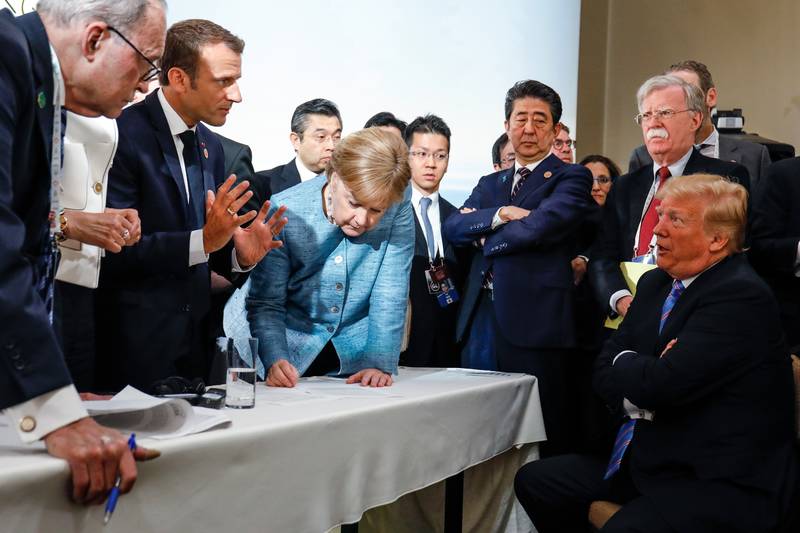 Macron, Merkel, Abe, Trump | © Council of the EU
Macron, Merkel, Abe, Trump | © Council of the EU Angela Merkel | © Bundesregierung
Angela Merkel | © Bundesregierung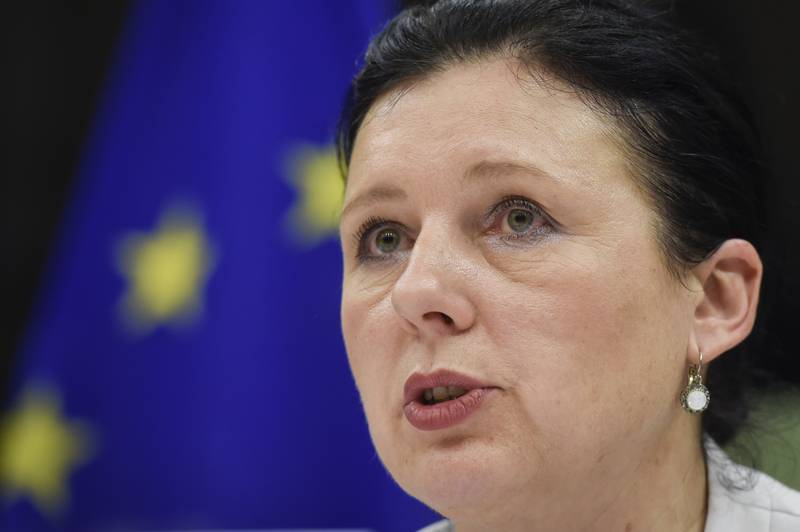 Vera Jourova | © European Parliament
Vera Jourova | © European Parliament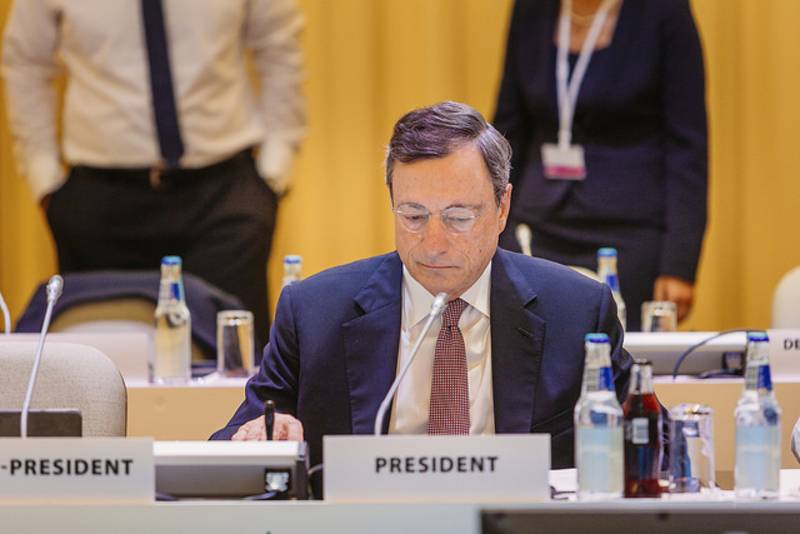 Mario Draghi | © ECB
Mario Draghi | © ECB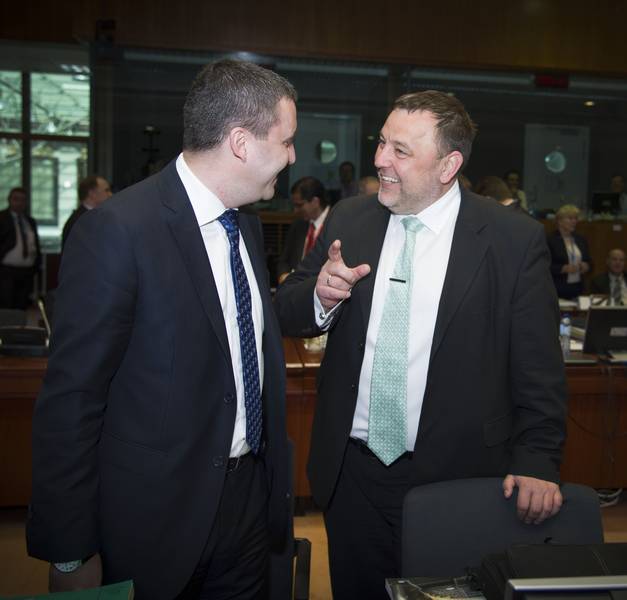 Vladislav Goranov, Sven Sester | © Council of the EU
Vladislav Goranov, Sven Sester | © Council of the EU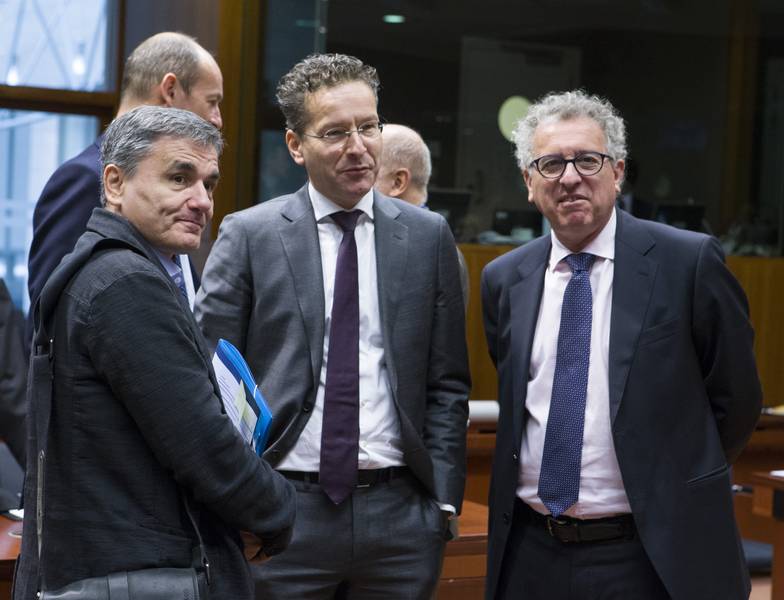 Tsakalotos, Djisselbloem, Gramegna | © Council of the EU
Tsakalotos, Djisselbloem, Gramegna | © Council of the EU